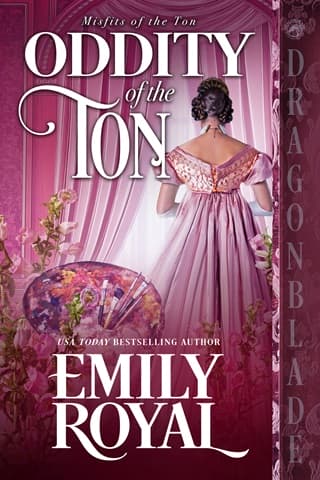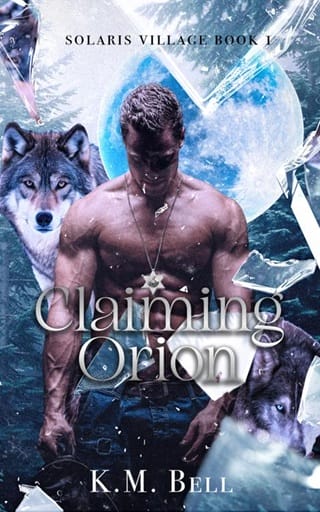Chapter Twenty-One
The silence in the drawing room thickened, until even the ticking of the clocks seemed to fade.
Not even the presence of the Stubbs over the fireplace could temper Eleanor's discomfort. And though she longed to inspect it, she found herself unable to articulate the words needed to present a proper request.
Not with that black-clad matriarch staring at her like a huge spider assessing her prey.
The butler had been bad enough—all spindly black legs and a hooked nose, reminding her of the long, thin beetles that often worked their way into the house at night, raising their hindquarters aggressively if disturbed. But at least he'd smiled at her. Eleanor doubted if the dowager Duchess of Whitcombe had smiled in the last ten years.
Or at all.
How might she word her request?
Your Grace, may I take a look at the painting?
That seemed benign enough—surely she'd not take umbrage at that. Though she ought to specify which painting.
Your Grace, may I take a look at the painting over the fireplace? His Grace tells me you know a great deal about it.
Was that how most people might open a discussion? A request intended not to offend, followed by comment intended to pacify her a little after the disastrous dinner.
But would the dowager think she was attempting to flatter her?
Oh dear!This was just the sort of occasion for which she needed Montague and his tutelage. He'd know precisely what to say.
Muffled laughter filtered through the hallway, and Eleanor exchanged a glance with Lavinia—her only ally in the dowager's lair.
"The gentlemen seem to be enjoying themselves," Lavinia said.
The dowager glanced pointedly toward Eleanor's hand—the same hand with which she'd picked up the wrong fork during the main course. "They are, yes."
"A-are you enjoying yourself, Your Grace?" Eleanor asked.
The dowager swiveled her head, subjecting Eleanor to the full force of her sharp blue eyes. They were the image of her son's, save for the tone—a glacial hue that sent a shiver through her blood, in sharp contrast to the heated gaze Whitcombe had tuned on her when they almost kissed at the stables.
"It's Duchess, Miss Howard."
"I-I beg pardon?" Eleanor stammered, and her coffee cup rattled against the saucer, no matter how tightly she gripped it. "I-I thought—"
"The first time you address a woman of my station, you say Your Grace, and thereafter you address me as Duchess. Didn't your mother teach you anything?"
"No, I had a governess."
If anything, Eleanor's response angered the woman further.
"I think Her Grace's question was rhetorical, Eleanor," Lavinia said, coming to her rescue. "But, Duchess, I'm afraid I must contradict you."
Sweet heaven!What was Lavinia trying to do—prod a viper?
"I beg pardon, Lady Marlow?"
"Miss Howard has yet to speak to you directly, Duchess. It's only right that she addressed you as Your Grace just then."
That, at least, was true. In fact, Eleanor hadn't spoken more than two words during dinner—to thank a footman, which had earned a glare of disapproval from the dowager.
The door opened, and the men strode in. Marlow crossed the floor to sit beside Lavinia, while Whitcombe approached Eleanor.
"Did you notice the Stubbs, Miss Howard?" he asked.
Eleanor glanced about, aware of four pairs of eyes trained on her.
He offered his hand. "Let me show you."
She took it, and he led her to the fireplace.
"What do you think?" he asked.
"It's definitely a Stubbs."
"Of course it's a Stubbs!" the dowager cried.
Oh dear—she'd caused offense again. Could she never think of the right thing to say?
"Miss Howard spotted a fake Stubbs in London, Mother," Whitcombe said, a hard edge to his voice. "She has an eye for these things."
"Oh, does she?"
To Eleanor's horror, the black-clad woman rose and glided across the carpet toward her. Had Eleanor felt herself snatched up by pincers, then dragged into a lair in the cellar, she wouldn't have been surprised.
"Y-yes—at Lady Francis's ball."
"Lady Francis, eh?" The dowager let out a snort. "I suppose I shouldn't be surprised—unless you're making mischief."
"Miss Howard doesn't make mischief, Mother," Whitcombe said.
"But she claims to be an authority on art."
"Oh, no, Your—I mean—Duchess," Eleanor said. "But I have a particular interest in George Stubbs." She turned to the painting, which depicted a horse standing proudly beside a groom, a rich myriad of browns and reds in the pelt, bringing the animal to life, such that Eleanor wouldn't have been surprised had the animal leaped out of the painting. Then she cast her gaze over the inscription at the bottom.
Geo. Stubbs pinxit 1762
"Pinxit!" Whitcombe said. "Just like you said that night."
"What night?" the dowager asked sharply. "Montague, explain."
"Miss Howard told me why she knew Lady Francis's painting was a fake."
"And will Miss Howard bestow her wisdom on our painting, and concede that it's genuine?"
Eleanor glanced at the painting once more, following the outline of the horse. Then her gaze settled on the animal's hind section, and she leaned closer. One of the back legs didn't look right—from the joint halfway up the leg, down to the hoof—and nor did the shadow it cast on the ground.
"It seems genuine," she said, then hesitated. Was now one of those times to suppress the truth?
"But?" the dowager demanded. "I sense there's a ‘but' coming on."
"Mother!" Whitcombe sighed.
"No, Montague, I'm sure we're all eager to hear what Miss Howard has to say."
Eleanor shrank at the emphasis of her name—Miss Howard—delivered as an insult, as if the old woman objected to having a mere miss in her home. But, given that whatever she said would offend the woman further, she might as well speak the truth.
"There's something wrong with one of the back legs," Eleanor said. "It's as if"—she pointed to the hind leg—"this section was painted by another."
"What do you mean?" the dowager asked, a little less frost in her tone.
Eleanor ran her fingertip along the hind leg. "It's not discernible from a distance, but on close inspection, it's more obvious."
"Obvious?"
Eleanor pointed to the leg. "See the color? It's a good likeness to the rest of the horse, but the reds are a little too bright. And the way the light lands on the leg is all wrong—the tendons beneath the skin are far less prominent than those in the other hind leg, yet they're positioned the same. Then there's the hoof."
"What about the hoof?" Whitcombe asked, leaning forward to inspect the picture.
"The color is too cool," Eleanor said. "It's as if the artist mixed a little too much blue on his palette. Gray is a more complex color to mix—most artists think it easy, but because it's formed by mixing all colors together, the chances of getting the tone right are very small. And look at the base of the hoof—the shadow is cast in the wrong direction. And it's the wrong color. A shadow takes on the color of that on which it's cast. See where it hits the grass? It should be dark green there, not gray."
The party fell silent.
Oh dear—have I just insulted the whole room?
"Well!" the dowager cried.
Yes—she had insulted the room or, at least, the most imposing person in it.
"Mother," Whitcombe said, a warning in his voice. "There's no need to be angry. Miss Howard meant no offense."
"Oh, be quiet, Montague!" the dowager said. "I'm not angry—though I admit to feeling a little insulted, given how much the thing cost me."
"Y-Your Grace—I mean, Duchess," Eleanor said. "Forgive me. I meant no—"
"I'm sure you didn't, my dear," the dowager said. "That particular charge, I'll lay at the feet of Mr. Rivers."
"I don't understand."
"He's a painter," the dowager said. "The wretched man charged me a small fortune to restore the painting after it was damaged."
"Damaged—how?" Whitcombe asked.
This time it was the dowager's turn to blush, and she looked away. "That matters not. What matters is that the restoration was clearly not of the standard I paid for."
Whitcombe leaned toward the painting and inspected it. "It seems good enough to me."
The dowager let out a snort. "Perhaps if you spent more time looking about, and focusing on your duties here rather than your pleasures, you'd notice many more things around here."
"Mother, this is hardly the time…"
"No," the dowager said. "I suppose it's not." She glanced at Eleanor. "You've a sharp eye, my dear. You must take tea with me tomorrow, after breakfast."
"We cannot visit you tomorrow, Mother," Whitcombe said. "I've arranged a picnic."
"I wasn't asking permission, Montague," came the reply, and Eleanor winced inwardly at the sharpness in the dowager's voice—she was a woman used to barking orders and having them obeyed instantly and without question. "We can picnic once tea is finished."
We?Surely the dowager wasn't going.
"Mother, we're going for a ride tomorrow. And Artemis is in season."
"I can ride Persephone." The dowager set her mouth into a firm line. "That's settled. We can leave once Miss Howard and I have finished our tea. I've no objection to Miss Howard visiting me in her riding habit."
"I have no riding habit, Your Grace," Eleanor said.
"No?" Another eyebrow arched. "I suppose that can't be helped. I'll see you at nine."
Eleanor dipped into a curtsey. "Yes, Duchess."
"And now, I find I'm rather tired," the dowager said. "Montague—walk me to the dower house."
"Yes, Mother."
Had her stomach not been fluttering with terror at the notion of taking tea with the dowager, Eleanor would have laughed at Whitcombe's monotonic Yes, Mother, not unlike how she responded to her own mother when she knew she'd lost the battle, and wished to give an appropriate response that did not elicit further salvos.
The dowager barked an order to one of the footmen, then glided toward the door. Whitcombe moved closer to Eleanor and took her hand, and her breath caught as he slid his fingers between hers.
"Thank you," he whispered.
"For what?"
"For accepting Mother's invitation."
"That was a royal decree, not an invitation," Eleanor said. Then she let out a gasp. "Oh, forgive me! I didn't mean to say that—I only meant to think it."
"There's nothing wrong with saying what's on your mind, Miss Howard," he replied. "I find it refreshing."
"Montague," his mother called from across the room. "I'm ready."
He rolled his eyes then kissed Eleanor's hand again. "Please excuse me. I'll see you at breakfast."
"Montague! Now!"
"Coming, Mother."
He bowed and escorted the dowager out.
Alone with Lavinia and Lord Marlow, Eleanor felt her body lift, as if a great weight had now been removed.
But her respite would be short-lived with the prospect of an audience with the dowager in the morning. The woman might have remarked on Eleanor's powers of observation, but Eleanor doubted if anything got past her sharp eyes. Like a pig hunting for truffles, she'd root out every flaw, every eccentricity in Eleanor's character, stripping back her layers until she'd exposed the weak soul within.
It wasn't as if her engagement to Whitcombe was permanent—it was, after all, due to end as the Season drew to a close. But one audience with his superior, disapproving mother would extinguish even the faintest glimmer of hope that she harbored in her dreams. The tiny voice that whispered of her dream—that he might sweep away convention, defy his pledge to break off their engagement at the end of the season, and declare his love for her—would, by tomorrow morning, be killed stone dead.
 Fullepub
Fullepub 



